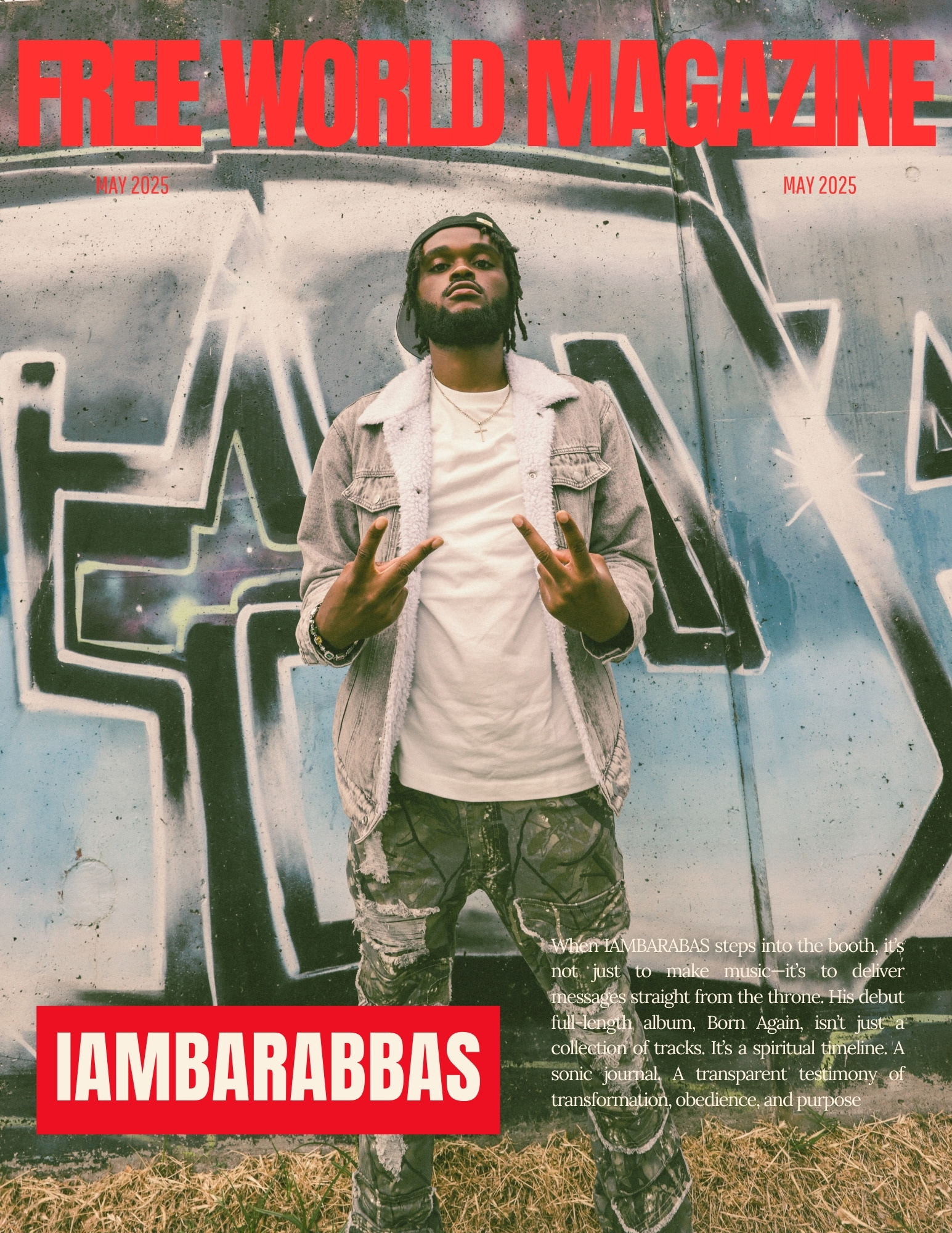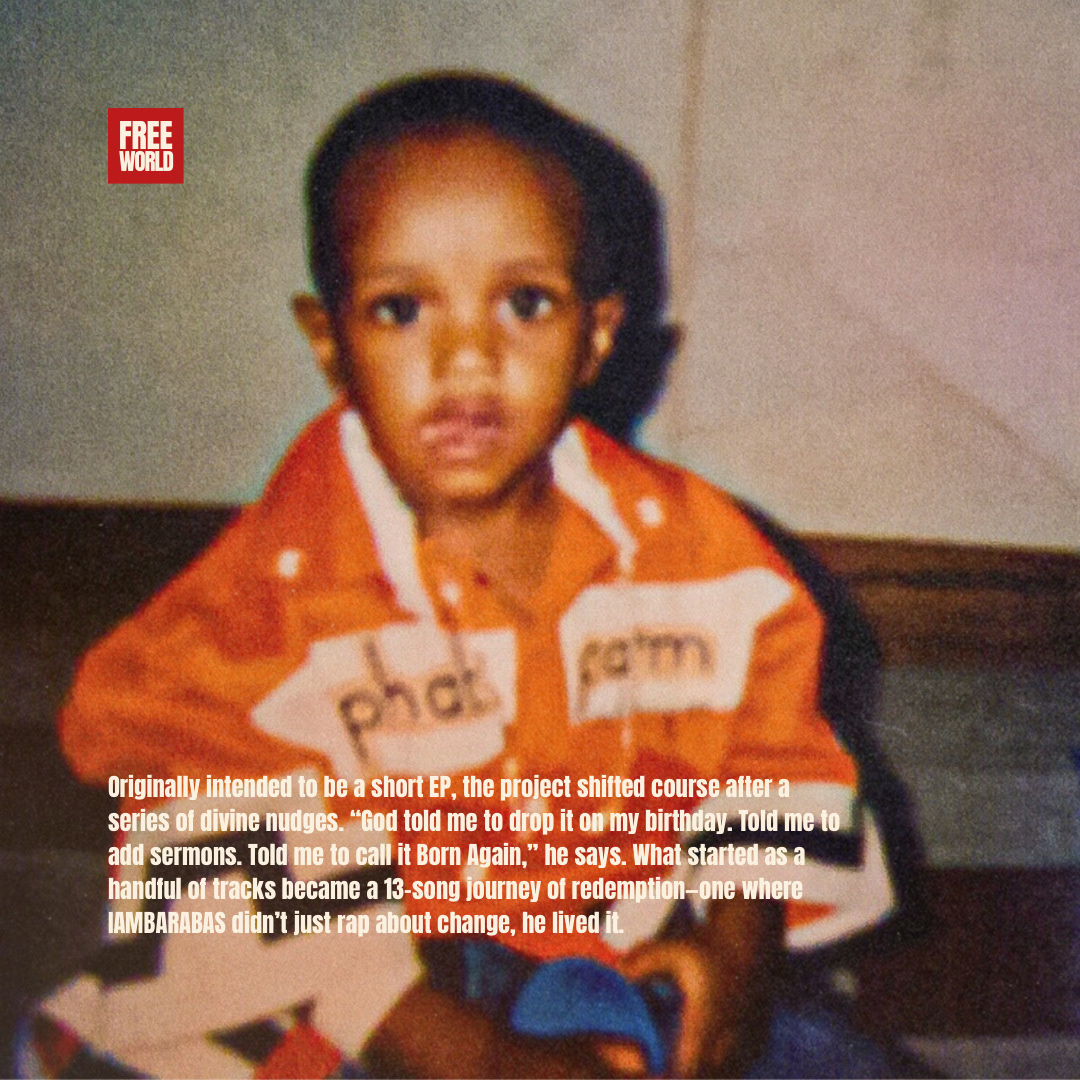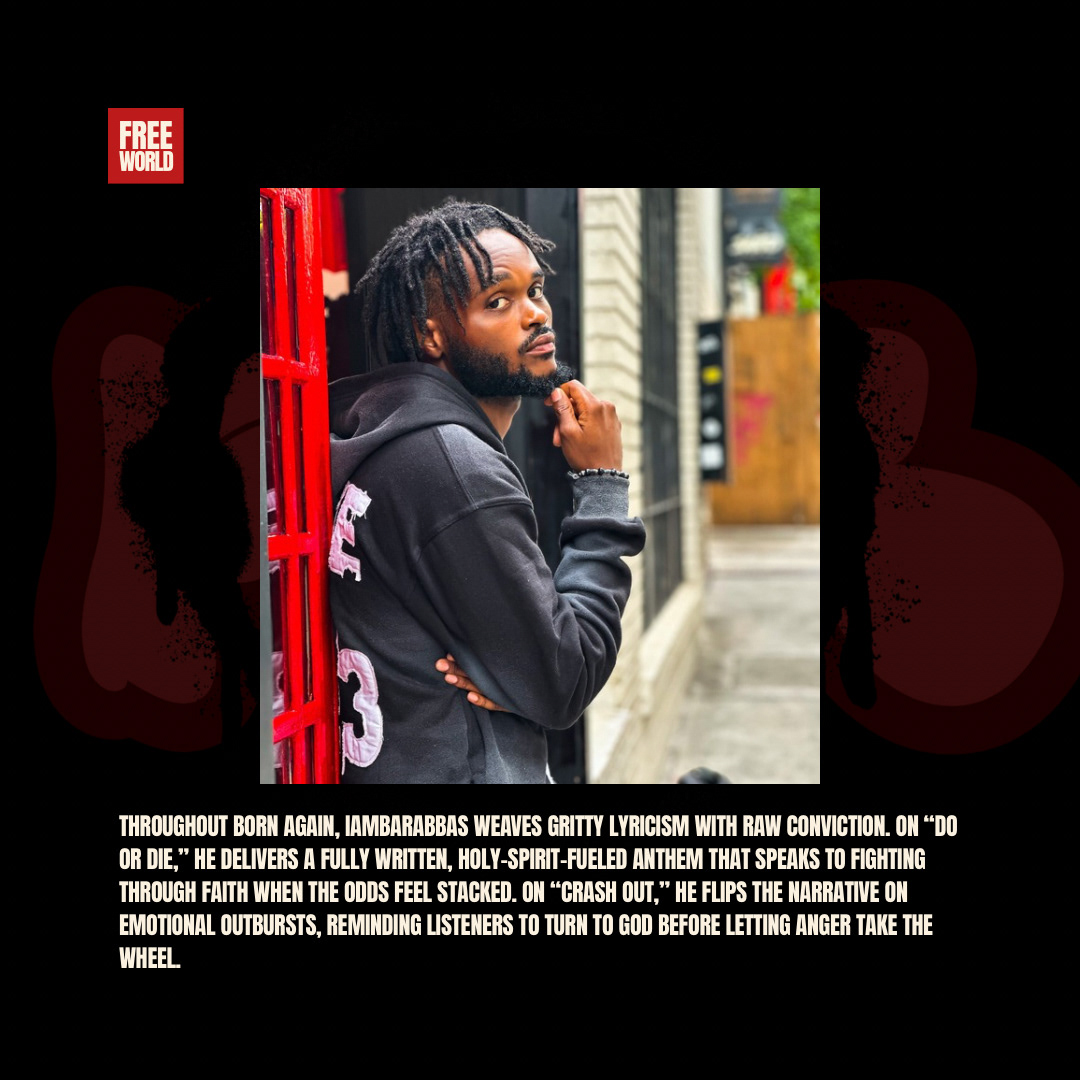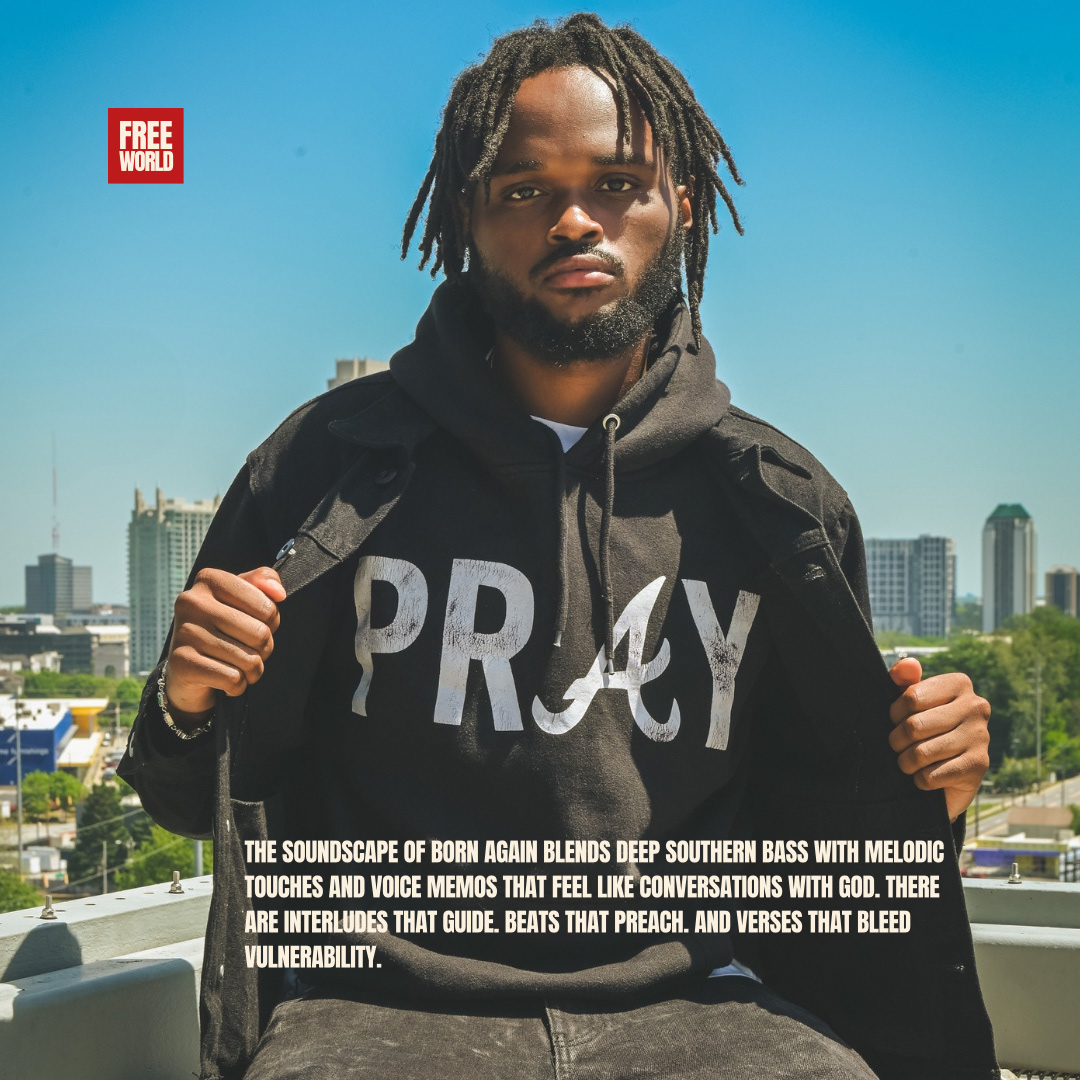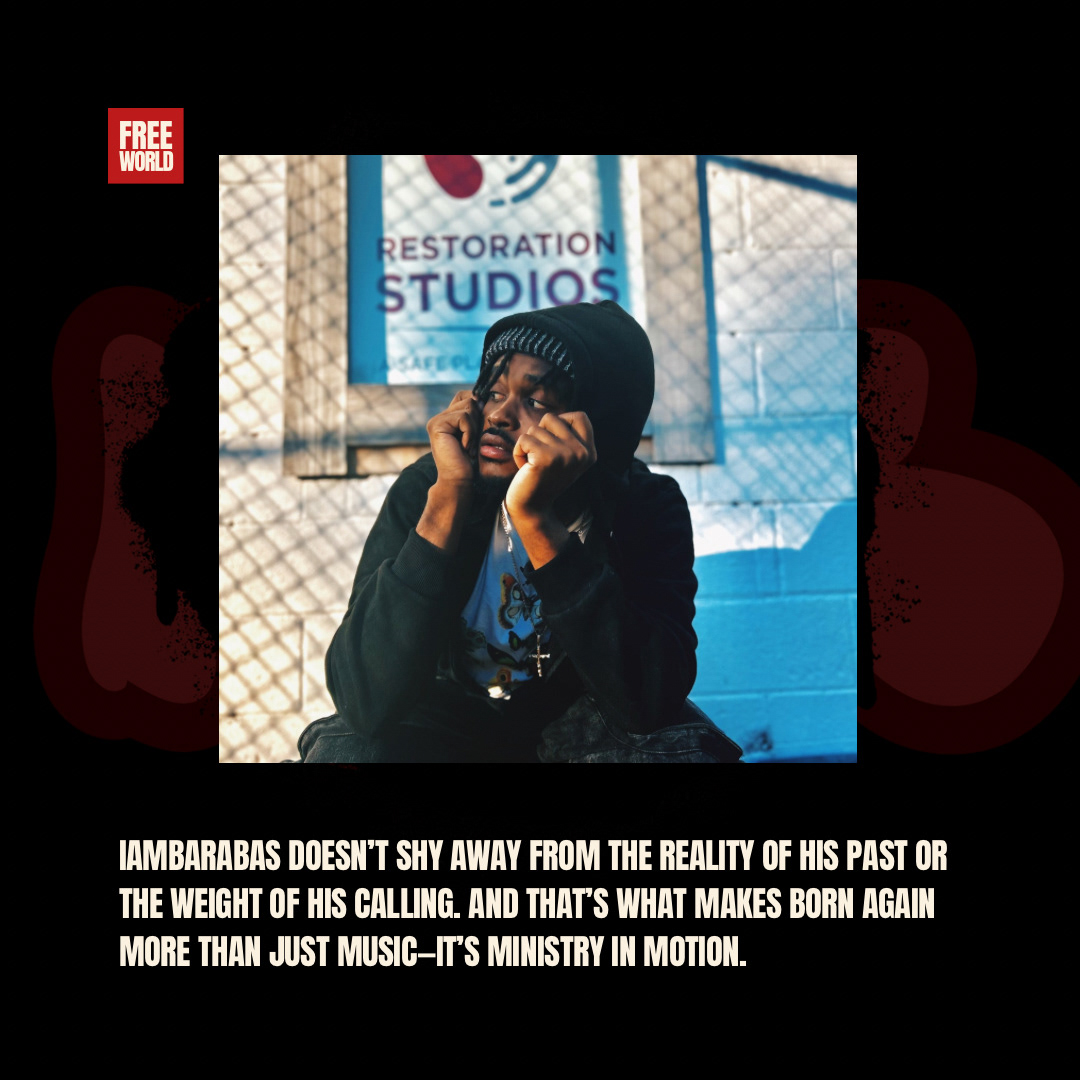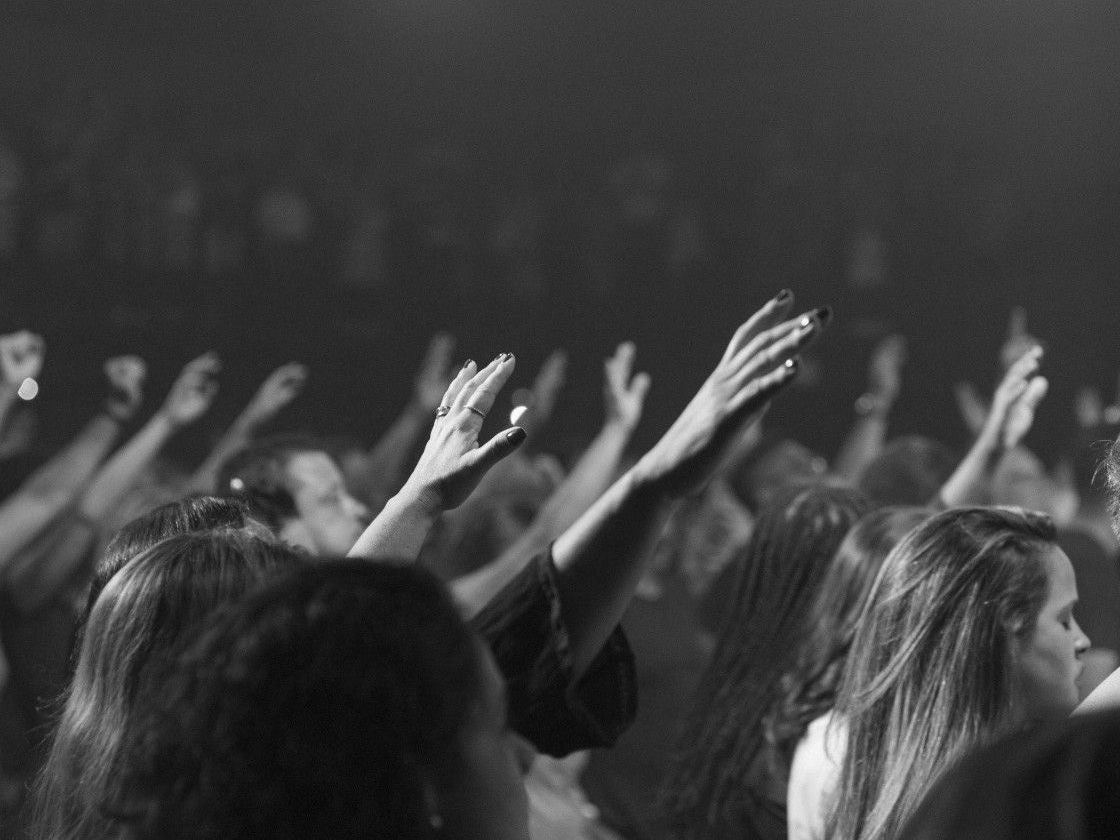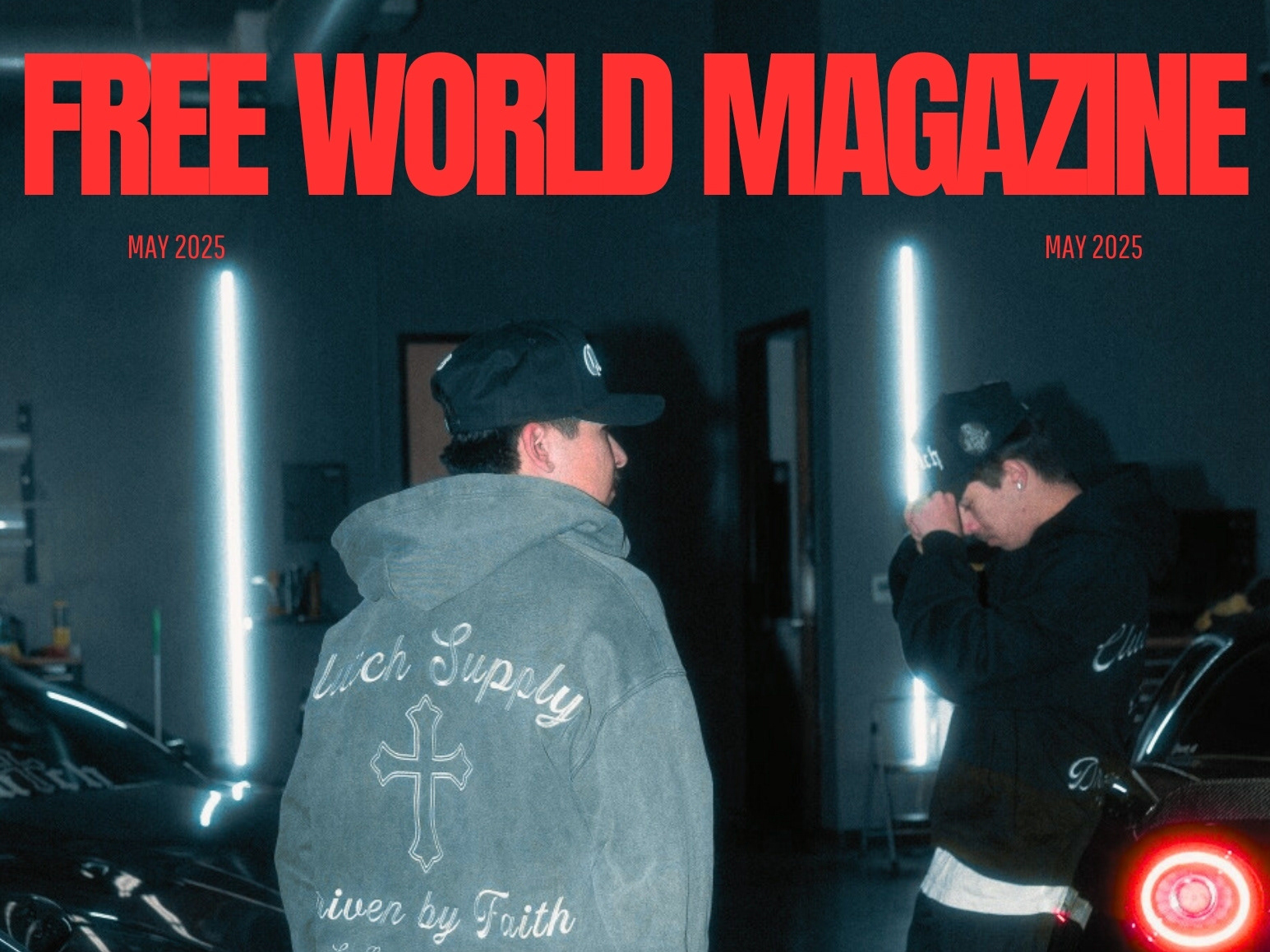Album Review: IAMBARABbAS Declares Spiritual Warfare with Born Again
By Dominique Brown | Free World Magazine
In an era where Christian hip-hop is breaking boundaries and pushing narratives rooted in faith and transparency, IAMBARABBAS’s Born Again isn’t just an album—it’s a testimony. A bold declaration that surrendering to God doesn’t weaken your voice; it strengthens your roar. In an exclusive sit-down with our interviewer, IAMBARABBAS gave an intimate look behind the veil of this spiritually charged project. From his late-night freestyles to hearing divine direction in isolation, Born Again is deeply autobiographical and spirit-led.
⸻
INTERVIEWER: Your intro. What made you pick that Martin Luther King Jr. sermon? That’s a very powerful way to start the album—it leads perfectly into the first song.
IAMBARABBAS: I’m gonna be real—I didn’t even know about that sermon until God led me to it. The original plan was to drop an EP in February with 7 songs, but God told me to wait and drop it on my birthday, April 19th. Then He said not 15, not 18—13. I didn’t even have 13 songs ready. I was stressed, like, “God, I only got 10 or 11.” And He said, “Put some interludes in there.” That’s when I got the idea to include sermons.
So I started searching “Martin Luther King sermon,” and that’s the first one that popped up—talking about being born again. And my album was already titled Born Again. I just laughed like, “God, You funny!” It all lined up perfectly. That’s how the intro came together.
INTERVIEWER: That transition from the intro into “Born Again” is my favorite part. That song feels really personal. What was your mindset when recording it? Did you write it or freestyle?
IAMBARABBAS: I freestyled it. It was 3 AM—I couldn’t sleep. I’d fallen asleep early, woke up around 2 AM, and couldn’t go back to bed. I usually don’t rap on YouTube beats because I produce or use my producer’s stuff, but I wasn’t feeling any of my usual beats that night.
So I hopped on YouTube, found a beat, and just started freestyling. I still got the voice memo. At first, I didn’t even like the song. It was just me getting some stuff off my chest. I wasn’t planning to drop it. But one of the interns at the studio heard it and was like, “Bro, you trippin’, this hard.” I listened again, and the Holy Spirit said, “Make this the intro.” So I added some talking at the end, and that was it.
⸻
INTERVIEWER: What about “DO OR DIE”? That one hit different. What was your creative process behind that track?
IAMBARABBAS: That one I fully wrote. I was in the studio trying to freestyle it at first, but it wasn’t hitting. My producer TrePap and I made the beat together, so I knew I had to do it justice. I had this line already written:
“All I had was a little bit of faith / All I had was prayer and grace.”
That part stuck. So I took the session home, sat with the beat in my room, and just started writing. That’s when the Holy Spirit really took over. The words weren’t forced; they poured out like water. Bar after bar, it felt like God was speaking through me. It was like a freestyle in how natural it felt—but every line was structured, intentional, and filled with purpose. I wasn’t just making a song—I was telling my story, testifying.
Even in moments when I felt stuck, my engineer was right there encouraging me. He told me, “Bro, you started this like a testimony, you gotta finish it the same way.” That shifted my mindset. I wasn’t just rapping anymore—I was declaring what God had brought me through. That song became bigger than me. It became a declaration of survival, obedience, and unshakable faith.
⸻
INTERVIEWER: Let’s talk about “3 Musketeers.” Why those specific people?
IAMBARABBAS: Man, funny thing is—the final lineup wasn’t even the original plan. At first, it was just supposed to be me, 404 Chew, and Ugly Josh. We already had a version done and everything. But deep down, something didn’t sit right with me. Then God made it clear—He was like, “That ain’t how I want it.” And when God speaks, I don’t question it. I knew I had to switch it up.
That’s when 1K Phew came into the picture. He heard the track, and he hit me like, “Twin, I need that!”—just like that, with ten extra N’s in the word “twin.” At first, I was hesitant. I didn’t even want three artists on the track, let alone four. I was thinking about length, chemistry, cohesion—but when I heard what Phew laid down, I was like, “Oh yeah, you snapped.” Josh already did his thing, so it all just came together like puzzle pieces.
After we finalized it, I mixed and mastered the track myself. We played it at the studio one day—Phew was there hearing it mixed for the first time—and someone caught it on video. I posted it to my story, and CHH Hub picked it up and reposted it. From there, it went up. Everybody started hitting me like, “Yo, when’s this dropping?!” That’s when I knew it was the right move. God had His hand on that track from the start—even through the changes and switch-ups. It’s crazy how He works.
INTERVIEWER: One of my favorites is that bouncy one—“PRETTY GIRLS LOVE JESUS.” Where’d that inspiration come from?
IAMBARABBAS: Shout out my brother TrePap for real—he sent me that beat, and as soon as I heard it, it gave me this groovy, almost laid-back but emotional vibe. It wasn’t necessarily an R&B beat, but it had that soul in it—the kind that makes you reflect. I didn’t want to come off like I was trying to make an R&B song, because that’s not really my lane, but I knew I had to speak from the heart on it. The emotions it stirred up were too real to ignore.
Everything I rapped on that track actually happened. It wasn’t just lyrics—it was my life, the real-time stuff I was dealing with. I didn’t try to fabricate anything or write from a character’s perspective. I just slowed down mentally and poured out what I was going through. I think that’s why it hit the way it did—because it’s honest. I didn’t overthink it.
And shout out to my best friend Jorie—she’s the one on that phone call in the track. That part really brought the whole vibe together. I didn’t give her a script or direction. I just sent her the song and said, “Say whatever you’d say if we were really on the phone right now—be real with it.” She understood the assignment and went crazy. Her part made it feel like you’re eavesdropping on a real conversation, and that’s the kind of authenticity I love about it.
⸻
INTERVIEWER: Let’s talk about “Crash Out.” That’s a loaded title. What message did you want people to take from it, especially considering your own journey?
IAMBARABBAS: I want people to really catch the full meaning—not just the first bar. Everybody hears, “I’m about to crash out,” and they stop there. But the next line is the key: “Let me go talk to God before I crash out.” That’s the message. If you stop and talk to God before reacting, before letting your emotions take over—you won’t crash out. That’s the difference now.
I used to have that crash-out mentality heavy. But as I’ve grown in Christ, I’ve learned that the more time I spend in the Word, the more He enters me. We all get His Spirit when we get saved, but it’s the staying in the Word that strengthens it. I still get the urge sometimes—I still feel that heat rise up—but now I recognize it and remember, “God’s in me.” That’s what humbles me. That’s how I know I’ve changed.
And it matters who you’re around too. You can’t stop crashing out if you’re still surrounded by people who crash out. Being around like-minded individuals—people who push you closer to God instead of pulling you back into chaos—that makes all the difference.
⸻
INTERVIEWER: Were you the first person in your circle to get saved and walk this path? And how has that shift affected your social life?
IAMBARABbAS: Most definitely—I was the first. When I gave my life to Christ, God had to pull me into full isolation. I spent the first three months after getting saved completely alone—just me and Him, locked in my room, studying the Word, letting Him rewire me from the inside out. At first, I tried to keep showing up around my old friends, thinking I could be a light, but those weren’t just casual influences—they were knee-deep in the streets. God made it clear: “Stay isolated unless I send you.” And I’ve stuck to that ever since.
That shift changed everything. Social life? It’s different now. I’ve got a solid community of brothers and sisters in Christ, and I’m thankful for that. But when it comes to real friends—the kind that truly walk with you in the trenches—that list is short. I’ve learned to stop chasing connections and let God bring the right people to me. It’s not that my old people don’t respect the change—it’s more that they don’t fully understand it. And I get it, because until you experience that transformation for yourself, it’s hard to grasp. But even with that distance, I still got love for them. I’m just walking a new path now—and it’s one God paved.
INTERVIEWER: Last one—“Goodbye Lucy.” Why’s that your favorite?
IAMBARABbAS: Man, “Goodbye Lucy” is personal. That’s not just a track to me—it’s a full-on worship moment. On the surface, it might sound like a hard-hitting rap, but spiritually, I was in a different zone. I wasn’t just spitting bars—I was letting go of bondage, declaring my freedom in Christ, and speaking directly to that old version of me I had to bury. Lucy, in this context, represents everything I had to leave behind—sin, temptation, pride, ego, anger—all of it.
When I stepped into the booth for that one, the Holy Spirit was heavy. I could feel Him moving. I actually had to calm myself down a few times while recording because I didn’t want my passion to come off as aggression. I didn’t want to sound angry—I wanted people to hear the breakthrough. That’s what made it a worship song to me. I wasn’t performing; I was pouring out. I was crying out in the spirit, letting the enemy know he lost, and letting God know I’m fully His.
I’ve had moments where I listen back to it and feel the same Holy Spirit presence I felt when I recorded it. That’s how I know it wasn’t just me in that booth. That was a collaboration—me and the Holy Spirit co-writing a declaration of freedom. It came from the deepest place in my heart, and every time I hear it, I’m reminded: I’m not going back. Goodbye Lucy for good.
⸻
IAMBARABBAS highlights the journey of an artist who is not only committed to his craft but also deeply rooted in his faith. His unwavering dedication to sharing his story and staying true to his beliefs in the face of life’s challenges serves as a powerful example of authenticity and perseverance. As IAMBARABBAS continues to break new ground, his music becomes a vehicle for transformation and inspiration. For those looking to experience an album that resonates with raw emotion and spiritual growth, be sure to check out his latest project, Born Again. It’s a must-listen for anyone seeking music that speaks to the soul and challenges the status quo. Tune in now and join the movement!
